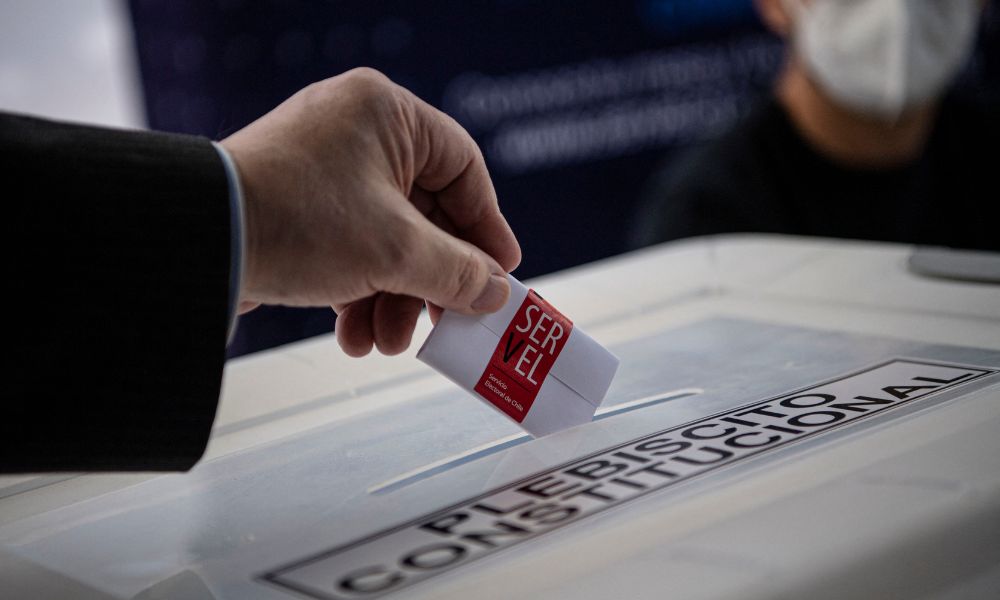Chile decides on Sunday between a liberal society or a more solidarity society
4 min read
Research indicates that the negative trend of the text that has been in place since the dictatorship of Augusto Pinochet continues

a Chile He decides whether to approve a new constitution to replace the one in force since the dictatorship of Augusto Pinochet (1973-1990), which, although reformed during democracy, abolishes market laws on education, health, and retirement, as well as to limit state intervention. This is one of the most important elections in recent years, and it could profoundly change the nation’s paradigm. Society views the current text as the root of inequality in the country, as it encourages the privatization of basic services. The new text, written more than a year ago by an association with a progressive direction and with parity between men and women, declares Chile a “social country of law” and is at the forefront of the world on issues such as combating the climate crisis and for equal rights. The result, which is expected to be close for both sides, will be announced a few hours after the polls close. There are expectations that the President of Chile, Gabriel Borekmake a statement on national television, regardless of the winning option.
More than 3,000 polling stations scattered across the country began receiving ballot boxes on Friday night, in addition to the ballot papers in which 15.1 million Chilean voters will have to choose the option “Apruebo” (I agree) or “Rechazo” (Decline), regarding the new text . To ensure security, more than 26,000 military personnel will work at polling stations, which will be open from 8 a.m. (Brazilian time) until 6 p.m. “All is well and the armed forces are mobilizing to control the polling stations in the next few hours so that we have a good operation,” Defense Minister Maya Fernandez said on Saturday.
Search indicates rejection
The latest opinion polls on voting intentions indicated a continuing trend towards rejecting the text, but experts consider that the scenario is open, as voting for the first time has become universal and mandatory, and there is a large number of voters. Years missed the polls. Rejecting the proposed text would preserve the Magna Carta, even though President Gabriel Borek has already announced that he will convene a new founding process and that it will be carried out with the mandate of the referendum in October 2020, in which nearly 80% of Chileans participate. They were in favor of changes to the document. The head of government, who supports the adoption of a new constitution, traveled yesterday to his hometown of Punta Arenas, more than 3,000 kilometers south of Santiago, to be able to vote early in the morning and then return to La Moneda Palace. “It is the Chileans and the Chileans who decide, for the first time in a democratic way, the content and form of the new constitution is the fact that it will undoubtedly happen or will happen on Sunday, is something that will transcend,” Borek stated. “I trust the wisdom of the Chilean people,” the president added. This will be the first mandatory voting election in a decade in a country with high abstention rates in recent opinion polls.

A Providencia municipal worker shows a ballot paper at a polling station before the referendum │MARTIN BERNETTI / AFP
The Standards Institute has indicated in the past few hours that 84% (12.6 million) of voters intend to go to the polls, which could mean a “participation revolution”. A recent survey of text conducted by Standards indicated that 42% of respondents disagree with its content, according to what they have heard or read. About 28% agree with it, although they consider it average, and 26% consider it exceptional. Its proponents believe the new pact can transform a previously conservative country with clear social, ethnic and economic divisions. They also believe that the new rules are the basis for a more equal Chile. Its critics already fear that these changes could lead Chile into the abyss.
What happens if the draft constitution is approved?
Regardless of the outcome, there is broad political consensus – according to polls – in favor of starting a new reform process Sunday night, for which several “road maps” have already been drawn up. “There is a consensus that the 1980 constitution is no longer valid and that we will move to another constitution, which is the result of a fully democratic process that also provided advanced scopes for establishing social, political and economic rights,” Cecilia Osorio, an academic at the University of Chile’s School of Government, told AFP. If approved, the draft constitution will enter into force ten days after the referendum. The new constitutional text ends the state that favors private initiative and implements a “social case of rights.” If the Rejection wins, the constitution drafted by the dictatorship remains in effect. It would also define Chile as a plurinational state, which recognizes the autonomy of indigenous peoples. It incorporates parity democracy, in which 50% of women hold government positions, would also allow the termination of pregnancy and would recognize sexual diversity. If the Rejection wins, the constitution drafted by the dictatorship remains in effect.
*With information from EFE and AFP

“Devoted food specialist. General alcohol fanatic. Amateur explorer. Infuriatingly humble social media scholar. Analyst.”




